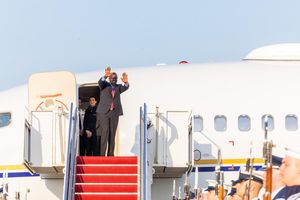AU suspends Niger from its activities, urges world to reject new leader

This video frame grab image shows General Abdourahamane Tchiani, Niger’s new strongman, speaking on national television after the ouster of President-elect Mohamed Bazoum.
What you need to know:
- AU Peace and Security Council also says only legitimate decisions are those by deposed President Mohamed Bazoum or his agents.
The African Union (AU) has decided to suspend Niger from its membership activities following the coup that deposed President Mohamed Bazoum on July 26, while also urging the rest of the world to reject the new government led by coup leader Gen Abdourahamane Tchiani.
The AU Peace and Security Council also says the only legitimate decisions are those by deposed President Bazoum or his agents.
The bloc has decided to take its time to study the possible impact of a planned military intervention in Niger before actual deployment, signaling the divisions that have punctuated the proposal first mooted by West African bloc Ecowas.
The Council said it “takes note of the Ecowas decision to deploy Standby Force and requests the AU Commission to undertake an assessment of the economic, social and security implications of deploying a Standby Force in Niger and report back to Council.”
The AU Council, chaired by Burundi, had actually sat on August 14 this year. But sources told Nation.Africa that a back-and-forth around the issue of deploying the military from Ecowas became a sticking issue with some members especially uncomfortable about the potential impact of having boots on the ground in Niger.
The AU’s tradition is to make decisions by consensus. Members later agreed to first investigate the impact of deployment, a diplomat familiar with the discussions told Nation.Africa.
The Council is AU’s main decision maker on issues of peace and security across the continent and often has powers to authorise such interventions. In 2017, it authorised an intervention in The Gambia when then leader Yayha Jammeh refused to concede defeat to the new election winner and current President, Adama Barrow. At the time, Barrow was forced to take oath of office at the Gambian embassy in Senegal.
Cameroon, Djibouti, Morocco, Namibia, Nigeria, Congo-Brazaville, The Gambia, Ghana, Senegal, South Africa, Tanzania, Tunisia, Uganda and Zimbabwe are the currently in the Council whose membership is rotated every two years among members of the AU.
The Council’s decision of its 168th meeting, however, showed the continental body was unwilling to work with the junta-led government of Gen Tchiani.
While not naming names, the Council also rejected “external interference by any actor or country outside the continent in the peace and security affairs in Africa, including engagements by private military companies in the continent.” This came amid reports that Russian private military group Wagner had contacted the junta in Niger.
The group has not publicly indicated whether it will enter the country, but it has previously taken advantage of chaos in countries such as Mali and the Central African Republic to cement influence.
In the meantime, the AU says it is working with Ecowas to compile and submit a list of members of the military junta and civilian supporters of the coup in Niger, “including those involved in the violation of fundamental human rights of President Bazoum and other detainees for targeted sanctions, and the application of individual punitive measures.”
Bazoum and his son and some members of his government are still detained in Niamey. The junta has refused to free them despite Ecowas threats to intervene militarily.





